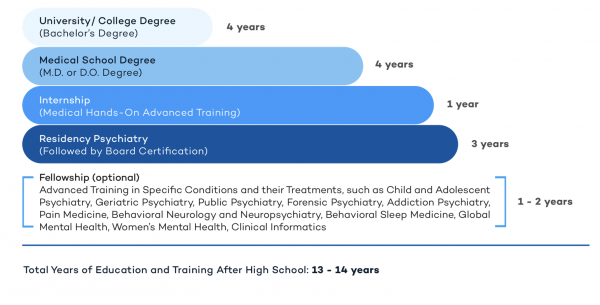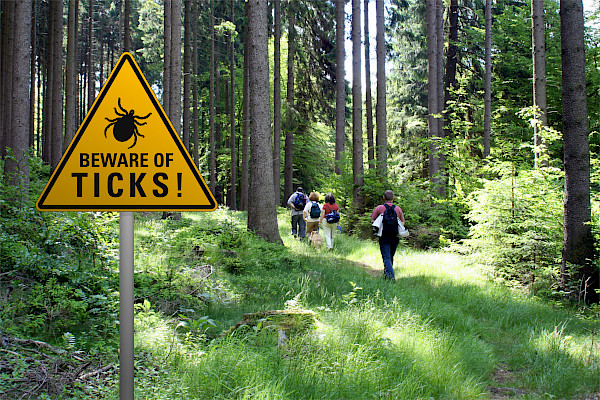
What is a Psychiatrist?
A Psychiatrist is a Board-Certified Doctor who treats and diagnoses all conditions pertaining to mental health, focusing, among others, on: the detection of mental illnesses, the treatment of learning disabilities, and the management of substance use disorders.
Ultimately, a Healthy Lifestyle and Prevention are the most important steps towards maintaining your mental health:
Important recommendations include:
- stay connected with family and friends
- use relaxation and stress management techniques such as yoga
- avoid excessive consumption of alcohol and drugs
- maintain a physical activity routine such as walking


Check for Ticks!
After spending time outside doing a yard cleanup, relaxing at the beach, hiking in the woods and grass, or visiting the dog park with your best friend, don’t forget to check for ticks! Tick bites can transmit Lyme disease, the most commonly reported tick-borne disease in the United States, and other dangerous diseases. In addition to Lyme disease, the top five tick-borne diseases reported in the United States include:
Rocky Mountain Spotted Disease, considered to be the most deadly of the tick-borne diseases;
Anaplasmosis; Ehrlichiosis. and Babesiosis.
Even if you live or visit in an area where deer are not plentiful, ticks are still a concern. Mice, gray squirrels, chipmunks, other rodents, rabbits, and even bird species can host infected tick larvae and nymphs. Our dog pets can inadvertently become tick hosts if they wander in the woods, tall grass, or visit an infested dog park.
So, after you arrive inside your home, first check your clothing for ticks. Remove any ticks you find, and machine wash your clothing in hot water, followed by tumbling dry on high heat. The CDC also recommends showering within 2 hours of arriving inside, as showering may wash any unattached ticks off your body and provides an opportunity to check your body for ticks. Don’t forget to check your pet too!
You can find some helpful pointers on tick bite prevention, tick removal, and checking yourself and your pet for ticks at:
https://www.cdc.gov/ticks/avoid/on_people.html and
https://www.cdc.gov/healthypets/pdfs/publications/check-pets-for-ticks-508.pdf
(Image below used under license from shutterstock)


HOW TO BEST PREPARE YOUR CHILD WITH ASTHMA OR ALLERGIES FOR SCHOOL
It’s that time of year again! Summer vacation is over and the kids are getting ready to go back to school. This Summer may have been met with some allergy challenges because it has been one of the hottest Summers on record. You may be worried about how your child with allergies and asthma may fare during the school year. Well, here are my five top tips to get your child with asthma or allergies ready for the school year.
1) Make sure the school is prepared to take care of your child in case of an emergency.
This is important for all children but specifically for children with food allergy and asthma. Children with food allergy must always have an adult ready to administer an epinephrine injector, and children with asthma must have access to an albuterol inhaler. Older children and high school children may know how to administer their medication. However, depending on the school’s policy and what is allowed, they may be restricted to seeing the school nurse or having the teacher administer the medications needed. It is important to feel comfortable with the school’s plan of action in case your child’s condition is to worsen. Have you discussed the signs and symptoms of when your child may be having a food allergy reaction or asthma attack with their teachers or school nurse? Does the school provide this type of training to their staff? These are all important questions to find out. If not, find out if there are plans to do so. Remember, it only takes one person to start change.
2) Has your child recently been evaluated by their Allergist.
An updated visit to your child’s allergist is always important, even with the most stable conditions. If your child is following up with their Allergist as directed, then you probably don’t have anything to worry about. If it has been a year or more, it is important that you schedule a follow-up soon. Over a year, many things can change. Your child’s medical condition or medical needs may have changed. Your child is growing and weight changes may require a change in dosing. Also, you can find out if new medications or treatments may be available. In addition, refills on expired medications may be needed. Lastly, an updated action plan on how to treat your child’s condition may be needed.
3) Address how medications will be given
Going back to school may mean a new schedule for your child and possibly yourself. Most allergy and asthma medications are given no more than twice a day. However, it can be difficult to coordinate the administration of a mid-day or late afternoon medication. Working with the school and your Allergist to figure out the best plan to have your child’s medication delivered correctly and timely with little interference to their day can be achieved.
In addition, a teenage child who has been given the responsibility of taking their own medications may need to be checked on periodically. It’s not unusual for me to see a teenager with exacerbated symptoms, all because they forgot a few too many times to take their medication and an upset parent sitting by their side. If you find that your child’s symptoms seem to be worsening or if you are not refilling their meds as expected, you may want to check on if they are taking their medications.
4)Address how your child’s condition may be affected by extracurricular and sports activity
A child with asthma and/or allergies may need special attention when it comes to them playing a sport or participating in extracurricular activities. Will they play outside but they have a severe pollen allergy? Will their asthma symptoms start once they start running? Or do you think your child’s care may need to be optimized so they can do their best? These are all questions that may be playing in your head. Addressing your concerns with your allergist is the first step. There are many ways to keep your child’s symptoms under control, including pretreating with medications prior to activities.
Furthermore, Extracurricular activities such as pottery making, painting, cooking, horticulture, etc, may have your child contacting possible allergens that may need to be addressed. If your child finds themselves with hives or a rash after an activity, testing and avoidance may be warranted.
5)Discuss your child’s care with caregivers
Coordinating your child’s supervision and safety to and from school may cause for other people to care for your child. Whether it is a friend’s mom carpooling the children to school, tutors, babysitters or nannies, it is important that all caregivers are aware of your child’s medical condition and have a plan of action. If you don’t have a plan of action, one may be obtained by your Allergist. Having one in place, may be particularly important in small children who may have difficulty expressing what they are feeling. Discussing the plan of action with your child’s caregiver will also help to give you insight on how comfortable your child’s caretaker is in implementing the action plan. If your child’s caregiver is not comfortable in recognizing signs and symptoms of your child’s medical problem or not comfortable in administering emergent medication, then secondary measures may need to be put in place, such as pre-prepared foods in a child with food allergy to decrease the likelihood of an accidental exposure, or maybe even a new caregiver. Most importantly, they should know how to contact you in case of an emergency.


Remembering my dear #mentor and #friend, Dr. Richard E. Fitzpatrick, well-renowned for his pioneering of many cosmetic dermatologic procedures, including #Laser #Skin #Resurfacing. But his greatest legacy truly was setting an example for us to follow of the virtues of a good physician: medical curiosity, compassion and humbleness.
(With my friends and colleagues, #CoolSculpting Specialists Carla Homez and Maria Ferrer.) #ASLMS 2014



#Social #Anxiety can be very stressful for children and can prevent them from making friends and performing well in school. Never hesitate to bring your child to the #Pediatrician or #ChildPsychiatrist if you notice him/her to be sad, not have friends in school, or have difficulties with academic performance. A proper evaluation can help make the correct diagnosis, determine the best treatment, and set him/her on the path to good #Mental #Health and fulfilling life experiences.


The term #ElectionStressDisorder has been used to address the #Anxiety that almost #TWO #THIRDS of #Americans feel during the current election process. If severe, it could actually lead to #Depression. My professional advice is to:
*Try your very best to continue with a healthy balance in your daily life, that includes family time, work and an exercise routine.
*Try also to catch up with friends and family, and *Consider reducing the amount of time spent watching TV and on various social media platforms.
